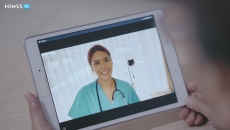HIMSS TV
It's crucial to pool resources to improve outcomes during times of crisis, says Dr. Monica Bharel, advanced clinical senior public health advisor and former commissioner of the Massachusetts Department of Public Health.
A shortage of skilled nursing is disrupting care delivery nationwide. The workforce challenge is not going away, and will require creative approaches, including virtual care, says Wendy Deibert, chief nursing officer at Caregility.
It's the place to be if you're interested and involved in transforming healthcare information and technology, says Ricardo Silva.
There are 13 startups from PharmaStars' cohort on digital innovation for women's health and health equity, and the accelerators' next cohort, Digital Innovations in Therapeutic Delivery. Naomi Fried, CEO and founder of PharmStars, offers a deep dive.
Digital patient engagement and payment tools provide price transparency and convenience for consumers and allow them to better manage care expenses, say Ryne Natzke, Sphere chief revenue officer, and John Welch, chief product officer.
Dr. Adrienne Boissy, Qualtrics' chief medical officer and staff neurologist at the Cleveland Clinic, explains that, because consumers are making value-based decisions and care about privacy, they should be codesigning healthcare AI.
Discussing the value and potential disruption of generative AI for healthcare, the chief medical information officer sees big value ahead from large language models, but says he's taking a cautiously deliberative approach to deploying them.
The nation is interested in sustainable outcomes for its patients, says Ran Balicer, chief innovation officer at Clalit Health Services – maintaining their health, not "heads in beds."
According to AWS International Government Health Lead Nicky Murphy, providers can improve their productivity and resilience by migrating to cloud. Cloud platforms also offer native AI and machine learning tools.
The RATE program's algorithm that worked like a "check engine light," getting service members with wearables into treatment faster, has implications for healthcare, says Jeffrey Schneider at the Department of Defense and Navin Natoewal of Philips.










